CNA782 - Professional Practice in Nursing: The Illness Experience
VerifiedAdded on 2023/04/25
|23
|6376
|203
Essay
AI Summary
This essay delves into the multifaceted role of a nurse as a professional practitioner, primarily focusing on the illness experience of patients and their families. It explores the emotional and psychological impact of chronic illnesses, drawing insights from readings and the movie 'Irreplaceable You.' The essay discusses how patients cope with changing bodies, altered relationships, and the uncertainty of their future. It further examines the themes of normality, peer acceptance, and the embodiment crisis experienced by chronically ill individuals. The author reflects on potential changes in their clinical practice, emphasizing empathy, hope, and comprehensive support for patients and their families throughout their illness journey, from diagnosis to bereavement. The essay also touches upon hospitalization, the logic of embodiment, and the importance of preparing patients for hospital stays, highlighting the critical role nurses play in providing holistic care and support.
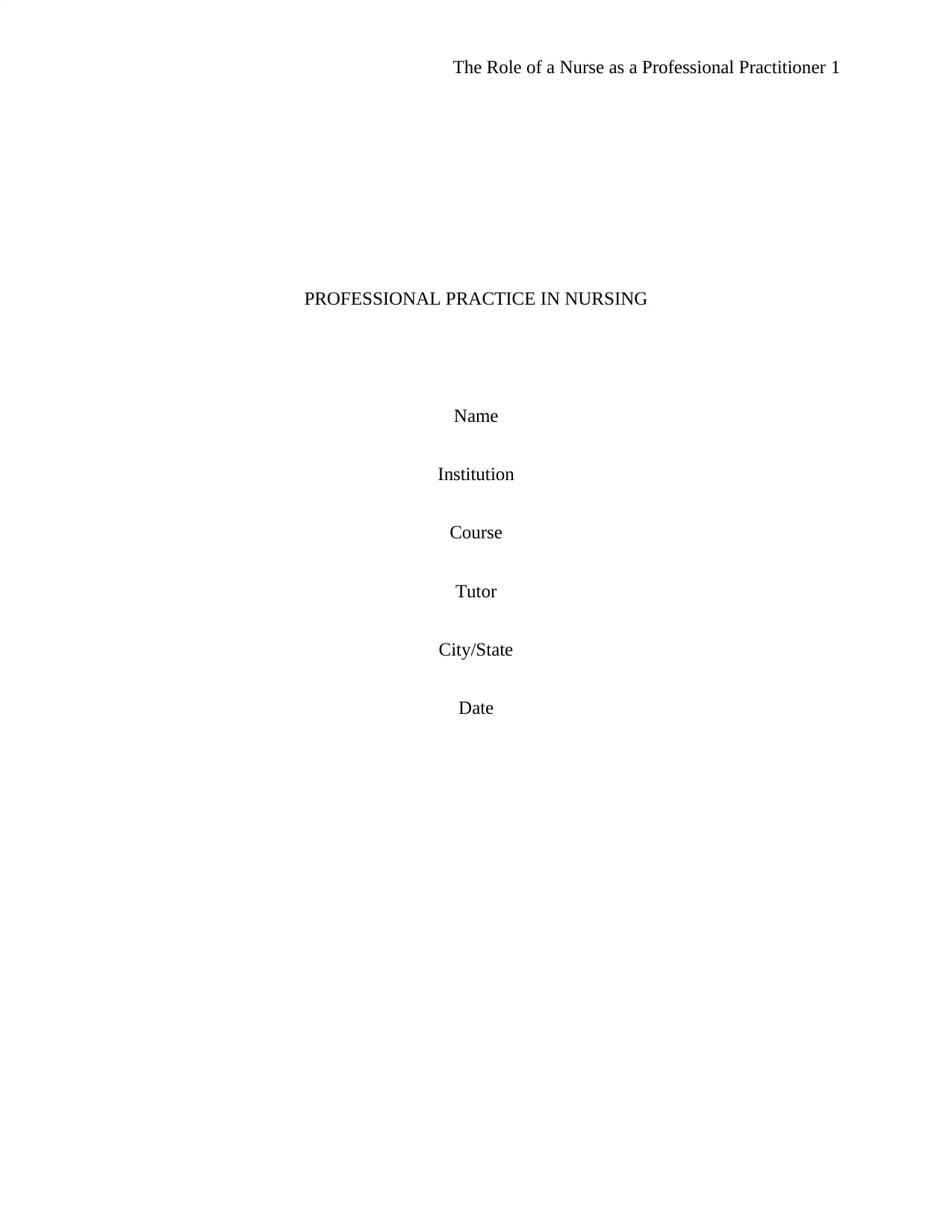
The Role of a Nurse as a Professional Practitioner 1
PROFESSIONAL PRACTICE IN NURSING
Name
Institution
Course
Tutor
City/State
Date
PROFESSIONAL PRACTICE IN NURSING
Name
Institution
Course
Tutor
City/State
Date
Paraphrase This Document
Need a fresh take? Get an instant paraphrase of this document with our AI Paraphraser
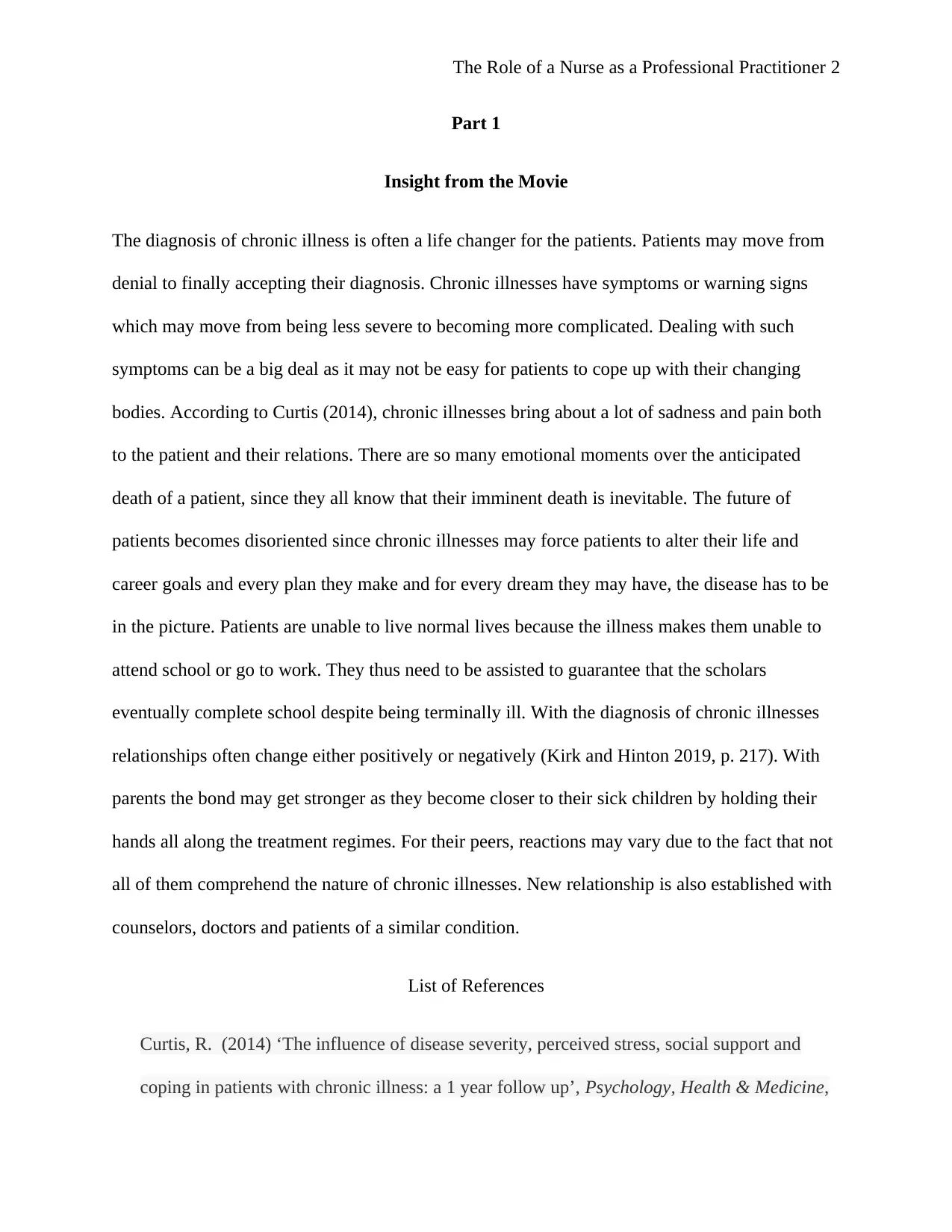
The Role of a Nurse as a Professional Practitioner 2
Part 1
Insight from the Movie
The diagnosis of chronic illness is often a life changer for the patients. Patients may move from
denial to finally accepting their diagnosis. Chronic illnesses have symptoms or warning signs
which may move from being less severe to becoming more complicated. Dealing with such
symptoms can be a big deal as it may not be easy for patients to cope up with their changing
bodies. According to Curtis (2014), chronic illnesses bring about a lot of sadness and pain both
to the patient and their relations. There are so many emotional moments over the anticipated
death of a patient, since they all know that their imminent death is inevitable. The future of
patients becomes disoriented since chronic illnesses may force patients to alter their life and
career goals and every plan they make and for every dream they may have, the disease has to be
in the picture. Patients are unable to live normal lives because the illness makes them unable to
attend school or go to work. They thus need to be assisted to guarantee that the scholars
eventually complete school despite being terminally ill. With the diagnosis of chronic illnesses
relationships often change either positively or negatively (Kirk and Hinton 2019, p. 217). With
parents the bond may get stronger as they become closer to their sick children by holding their
hands all along the treatment regimes. For their peers, reactions may vary due to the fact that not
all of them comprehend the nature of chronic illnesses. New relationship is also established with
counselors, doctors and patients of a similar condition.
List of References
Curtis, R. (2014) ‘The influence of disease severity, perceived stress, social support and
coping in patients with chronic illness: a 1 year follow up’, Psychology, Health & Medicine,
Part 1
Insight from the Movie
The diagnosis of chronic illness is often a life changer for the patients. Patients may move from
denial to finally accepting their diagnosis. Chronic illnesses have symptoms or warning signs
which may move from being less severe to becoming more complicated. Dealing with such
symptoms can be a big deal as it may not be easy for patients to cope up with their changing
bodies. According to Curtis (2014), chronic illnesses bring about a lot of sadness and pain both
to the patient and their relations. There are so many emotional moments over the anticipated
death of a patient, since they all know that their imminent death is inevitable. The future of
patients becomes disoriented since chronic illnesses may force patients to alter their life and
career goals and every plan they make and for every dream they may have, the disease has to be
in the picture. Patients are unable to live normal lives because the illness makes them unable to
attend school or go to work. They thus need to be assisted to guarantee that the scholars
eventually complete school despite being terminally ill. With the diagnosis of chronic illnesses
relationships often change either positively or negatively (Kirk and Hinton 2019, p. 217). With
parents the bond may get stronger as they become closer to their sick children by holding their
hands all along the treatment regimes. For their peers, reactions may vary due to the fact that not
all of them comprehend the nature of chronic illnesses. New relationship is also established with
counselors, doctors and patients of a similar condition.
List of References
Curtis, R. (2014) ‘The influence of disease severity, perceived stress, social support and
coping in patients with chronic illness: a 1 year follow up’, Psychology, Health & Medicine,
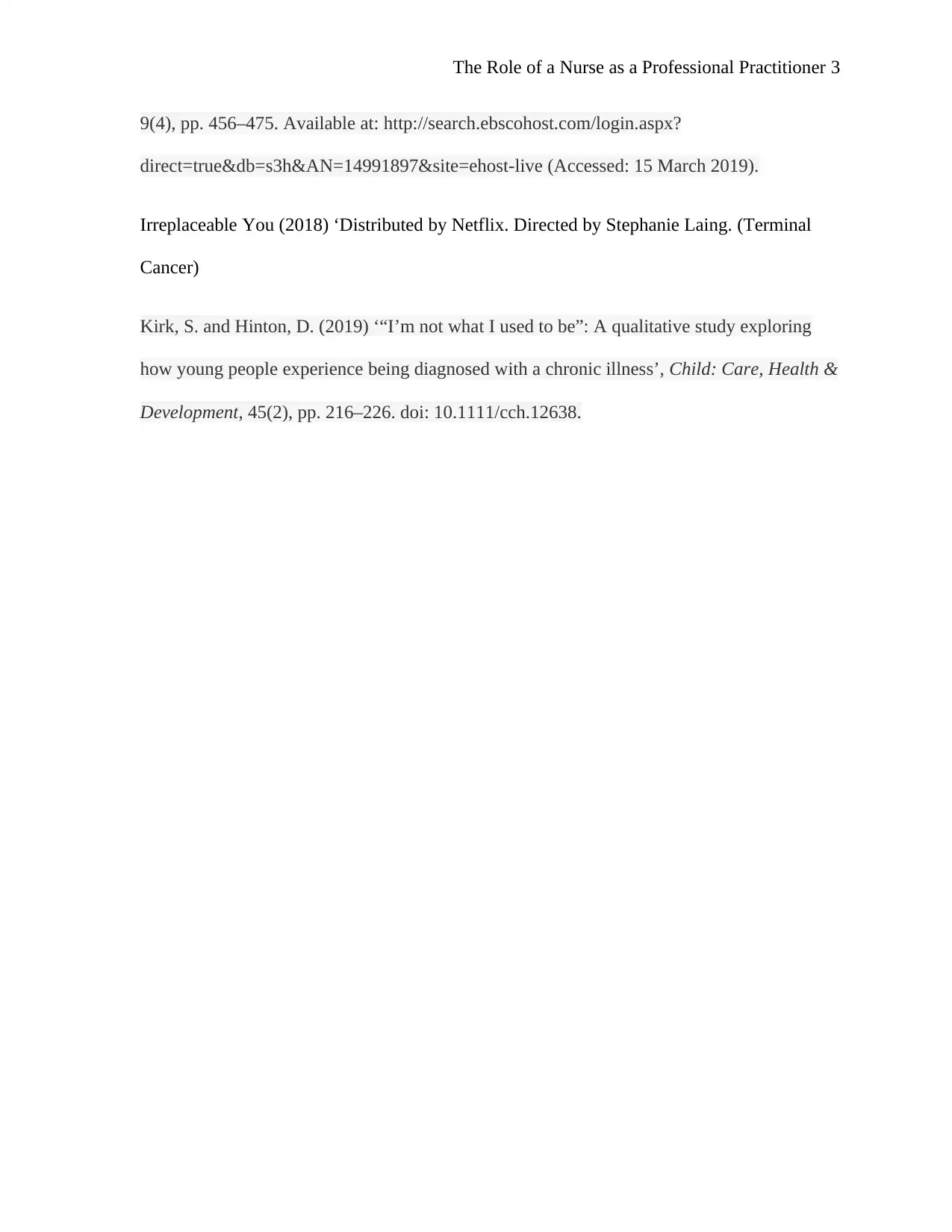
The Role of a Nurse as a Professional Practitioner 3
9(4), pp. 456–475. Available at: http://search.ebscohost.com/login.aspx?
direct=true&db=s3h&AN=14991897&site=ehost-live (Accessed: 15 March 2019).
Irreplaceable You (2018) ‘Distributed by Netflix. Directed by Stephanie Laing. (Terminal
Cancer)
Kirk, S. and Hinton, D. (2019) ‘“I’m not what I used to be”: A qualitative study exploring
how young people experience being diagnosed with a chronic illness’, Child: Care, Health &
Development, 45(2), pp. 216–226. doi: 10.1111/cch.12638.
9(4), pp. 456–475. Available at: http://search.ebscohost.com/login.aspx?
direct=true&db=s3h&AN=14991897&site=ehost-live (Accessed: 15 March 2019).
Irreplaceable You (2018) ‘Distributed by Netflix. Directed by Stephanie Laing. (Terminal
Cancer)
Kirk, S. and Hinton, D. (2019) ‘“I’m not what I used to be”: A qualitative study exploring
how young people experience being diagnosed with a chronic illness’, Child: Care, Health &
Development, 45(2), pp. 216–226. doi: 10.1111/cch.12638.
⊘ This is a preview!⊘
Do you want full access?
Subscribe today to unlock all pages.

Trusted by 1+ million students worldwide
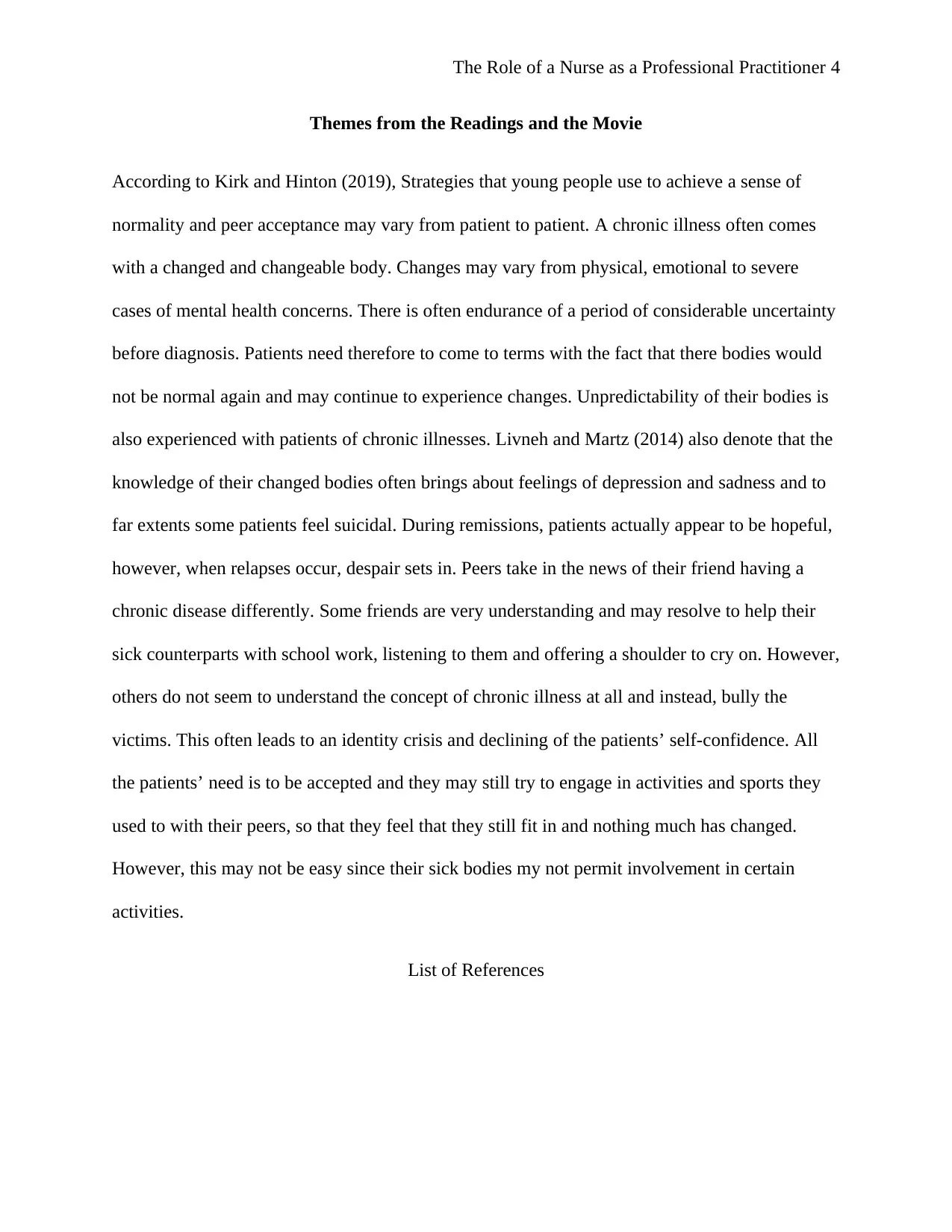
The Role of a Nurse as a Professional Practitioner 4
Themes from the Readings and the Movie
According to Kirk and Hinton (2019), Strategies that young people use to achieve a sense of
normality and peer acceptance may vary from patient to patient. A chronic illness often comes
with a changed and changeable body. Changes may vary from physical, emotional to severe
cases of mental health concerns. There is often endurance of a period of considerable uncertainty
before diagnosis. Patients need therefore to come to terms with the fact that there bodies would
not be normal again and may continue to experience changes. Unpredictability of their bodies is
also experienced with patients of chronic illnesses. Livneh and Martz (2014) also denote that the
knowledge of their changed bodies often brings about feelings of depression and sadness and to
far extents some patients feel suicidal. During remissions, patients actually appear to be hopeful,
however, when relapses occur, despair sets in. Peers take in the news of their friend having a
chronic disease differently. Some friends are very understanding and may resolve to help their
sick counterparts with school work, listening to them and offering a shoulder to cry on. However,
others do not seem to understand the concept of chronic illness at all and instead, bully the
victims. This often leads to an identity crisis and declining of the patients’ self-confidence. All
the patients’ need is to be accepted and they may still try to engage in activities and sports they
used to with their peers, so that they feel that they still fit in and nothing much has changed.
However, this may not be easy since their sick bodies my not permit involvement in certain
activities.
List of References
Themes from the Readings and the Movie
According to Kirk and Hinton (2019), Strategies that young people use to achieve a sense of
normality and peer acceptance may vary from patient to patient. A chronic illness often comes
with a changed and changeable body. Changes may vary from physical, emotional to severe
cases of mental health concerns. There is often endurance of a period of considerable uncertainty
before diagnosis. Patients need therefore to come to terms with the fact that there bodies would
not be normal again and may continue to experience changes. Unpredictability of their bodies is
also experienced with patients of chronic illnesses. Livneh and Martz (2014) also denote that the
knowledge of their changed bodies often brings about feelings of depression and sadness and to
far extents some patients feel suicidal. During remissions, patients actually appear to be hopeful,
however, when relapses occur, despair sets in. Peers take in the news of their friend having a
chronic disease differently. Some friends are very understanding and may resolve to help their
sick counterparts with school work, listening to them and offering a shoulder to cry on. However,
others do not seem to understand the concept of chronic illness at all and instead, bully the
victims. This often leads to an identity crisis and declining of the patients’ self-confidence. All
the patients’ need is to be accepted and they may still try to engage in activities and sports they
used to with their peers, so that they feel that they still fit in and nothing much has changed.
However, this may not be easy since their sick bodies my not permit involvement in certain
activities.
List of References
Paraphrase This Document
Need a fresh take? Get an instant paraphrase of this document with our AI Paraphraser
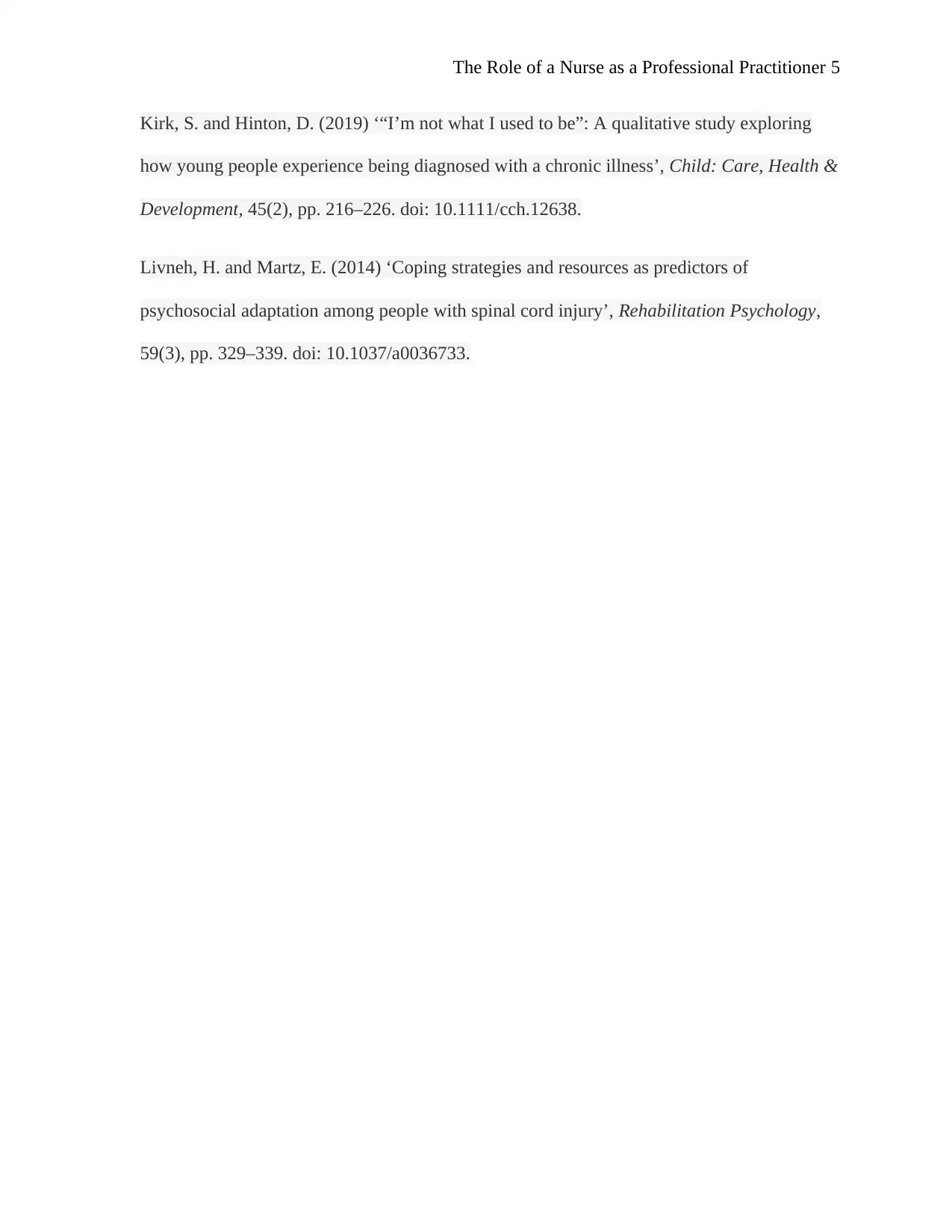
The Role of a Nurse as a Professional Practitioner 5
Kirk, S. and Hinton, D. (2019) ‘“I’m not what I used to be”: A qualitative study exploring
how young people experience being diagnosed with a chronic illness’, Child: Care, Health &
Development, 45(2), pp. 216–226. doi: 10.1111/cch.12638.
Livneh, H. and Martz, E. (2014) ‘Coping strategies and resources as predictors of
psychosocial adaptation among people with spinal cord injury’, Rehabilitation Psychology,
59(3), pp. 329–339. doi: 10.1037/a0036733.
Kirk, S. and Hinton, D. (2019) ‘“I’m not what I used to be”: A qualitative study exploring
how young people experience being diagnosed with a chronic illness’, Child: Care, Health &
Development, 45(2), pp. 216–226. doi: 10.1111/cch.12638.
Livneh, H. and Martz, E. (2014) ‘Coping strategies and resources as predictors of
psychosocial adaptation among people with spinal cord injury’, Rehabilitation Psychology,
59(3), pp. 329–339. doi: 10.1037/a0036733.
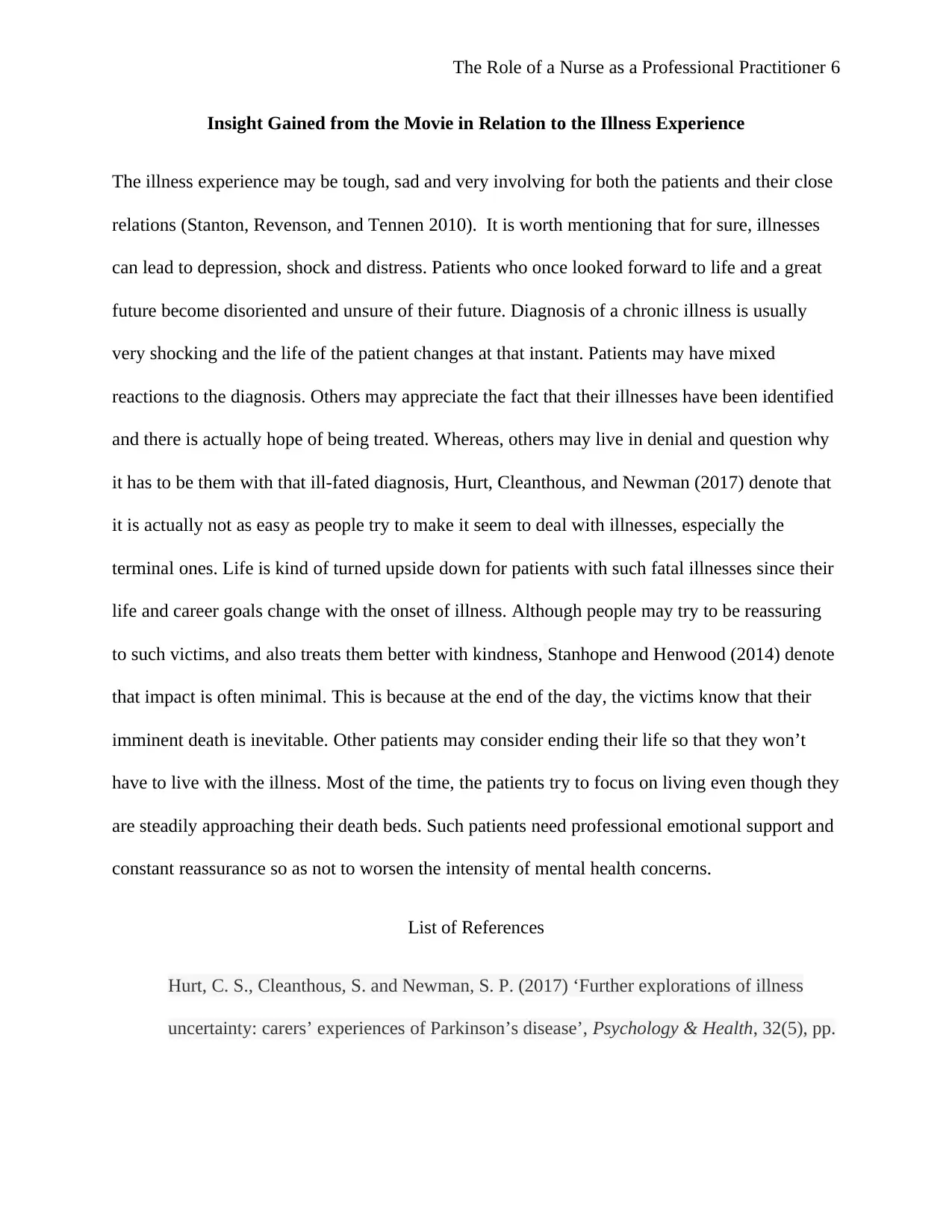
The Role of a Nurse as a Professional Practitioner 6
Insight Gained from the Movie in Relation to the Illness Experience
The illness experience may be tough, sad and very involving for both the patients and their close
relations (Stanton, Revenson, and Tennen 2010). It is worth mentioning that for sure, illnesses
can lead to depression, shock and distress. Patients who once looked forward to life and a great
future become disoriented and unsure of their future. Diagnosis of a chronic illness is usually
very shocking and the life of the patient changes at that instant. Patients may have mixed
reactions to the diagnosis. Others may appreciate the fact that their illnesses have been identified
and there is actually hope of being treated. Whereas, others may live in denial and question why
it has to be them with that ill-fated diagnosis, Hurt, Cleanthous, and Newman (2017) denote that
it is actually not as easy as people try to make it seem to deal with illnesses, especially the
terminal ones. Life is kind of turned upside down for patients with such fatal illnesses since their
life and career goals change with the onset of illness. Although people may try to be reassuring
to such victims, and also treats them better with kindness, Stanhope and Henwood (2014) denote
that impact is often minimal. This is because at the end of the day, the victims know that their
imminent death is inevitable. Other patients may consider ending their life so that they won’t
have to live with the illness. Most of the time, the patients try to focus on living even though they
are steadily approaching their death beds. Such patients need professional emotional support and
constant reassurance so as not to worsen the intensity of mental health concerns.
List of References
Hurt, C. S., Cleanthous, S. and Newman, S. P. (2017) ‘Further explorations of illness
uncertainty: carers’ experiences of Parkinson’s disease’, Psychology & Health, 32(5), pp.
Insight Gained from the Movie in Relation to the Illness Experience
The illness experience may be tough, sad and very involving for both the patients and their close
relations (Stanton, Revenson, and Tennen 2010). It is worth mentioning that for sure, illnesses
can lead to depression, shock and distress. Patients who once looked forward to life and a great
future become disoriented and unsure of their future. Diagnosis of a chronic illness is usually
very shocking and the life of the patient changes at that instant. Patients may have mixed
reactions to the diagnosis. Others may appreciate the fact that their illnesses have been identified
and there is actually hope of being treated. Whereas, others may live in denial and question why
it has to be them with that ill-fated diagnosis, Hurt, Cleanthous, and Newman (2017) denote that
it is actually not as easy as people try to make it seem to deal with illnesses, especially the
terminal ones. Life is kind of turned upside down for patients with such fatal illnesses since their
life and career goals change with the onset of illness. Although people may try to be reassuring
to such victims, and also treats them better with kindness, Stanhope and Henwood (2014) denote
that impact is often minimal. This is because at the end of the day, the victims know that their
imminent death is inevitable. Other patients may consider ending their life so that they won’t
have to live with the illness. Most of the time, the patients try to focus on living even though they
are steadily approaching their death beds. Such patients need professional emotional support and
constant reassurance so as not to worsen the intensity of mental health concerns.
List of References
Hurt, C. S., Cleanthous, S. and Newman, S. P. (2017) ‘Further explorations of illness
uncertainty: carers’ experiences of Parkinson’s disease’, Psychology & Health, 32(5), pp.
⊘ This is a preview!⊘
Do you want full access?
Subscribe today to unlock all pages.

Trusted by 1+ million students worldwide
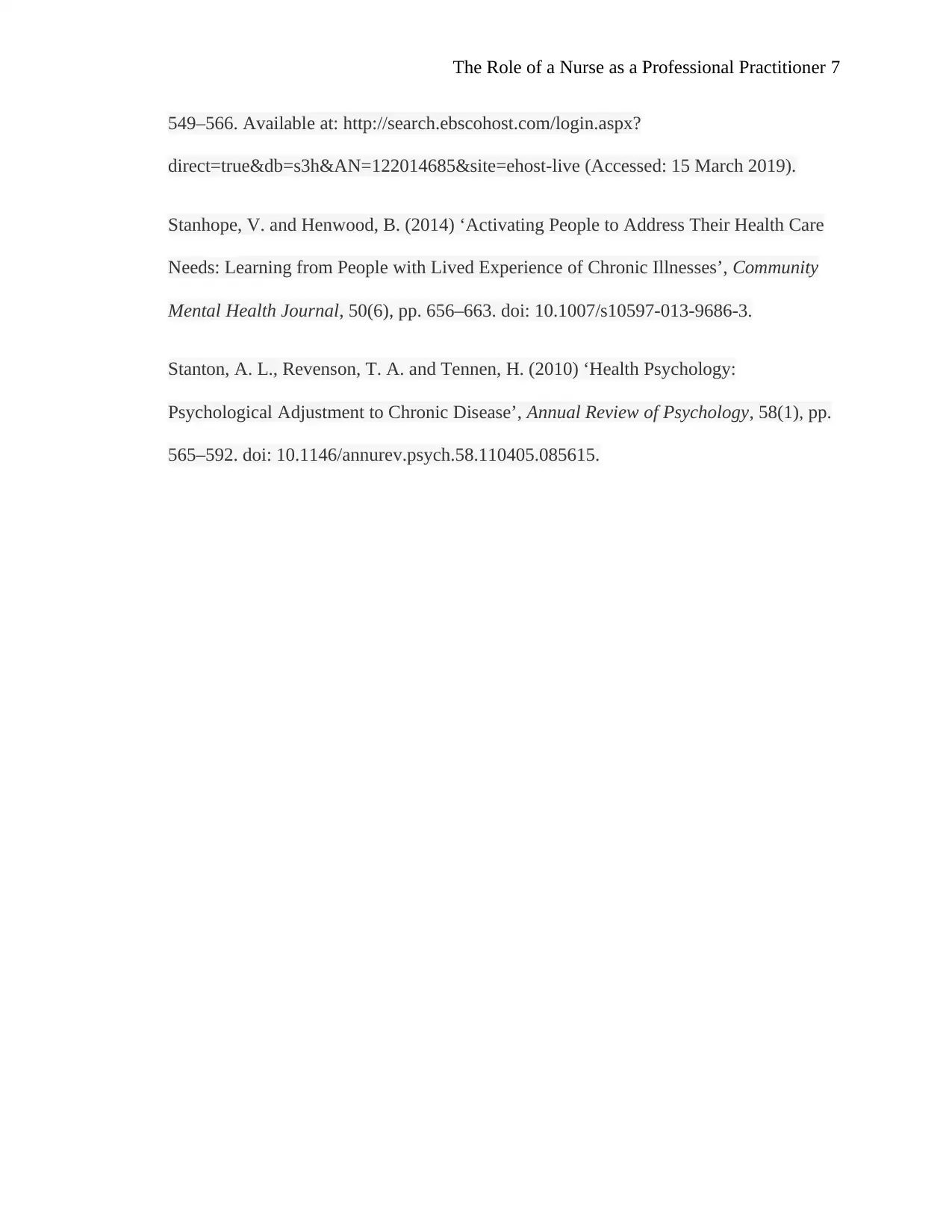
The Role of a Nurse as a Professional Practitioner 7
549–566. Available at: http://search.ebscohost.com/login.aspx?
direct=true&db=s3h&AN=122014685&site=ehost-live (Accessed: 15 March 2019).
Stanhope, V. and Henwood, B. (2014) ‘Activating People to Address Their Health Care
Needs: Learning from People with Lived Experience of Chronic Illnesses’, Community
Mental Health Journal, 50(6), pp. 656–663. doi: 10.1007/s10597-013-9686-3.
Stanton, A. L., Revenson, T. A. and Tennen, H. (2010) ‘Health Psychology:
Psychological Adjustment to Chronic Disease’, Annual Review of Psychology, 58(1), pp.
565–592. doi: 10.1146/annurev.psych.58.110405.085615.
549–566. Available at: http://search.ebscohost.com/login.aspx?
direct=true&db=s3h&AN=122014685&site=ehost-live (Accessed: 15 March 2019).
Stanhope, V. and Henwood, B. (2014) ‘Activating People to Address Their Health Care
Needs: Learning from People with Lived Experience of Chronic Illnesses’, Community
Mental Health Journal, 50(6), pp. 656–663. doi: 10.1007/s10597-013-9686-3.
Stanton, A. L., Revenson, T. A. and Tennen, H. (2010) ‘Health Psychology:
Psychological Adjustment to Chronic Disease’, Annual Review of Psychology, 58(1), pp.
565–592. doi: 10.1146/annurev.psych.58.110405.085615.
Paraphrase This Document
Need a fresh take? Get an instant paraphrase of this document with our AI Paraphraser
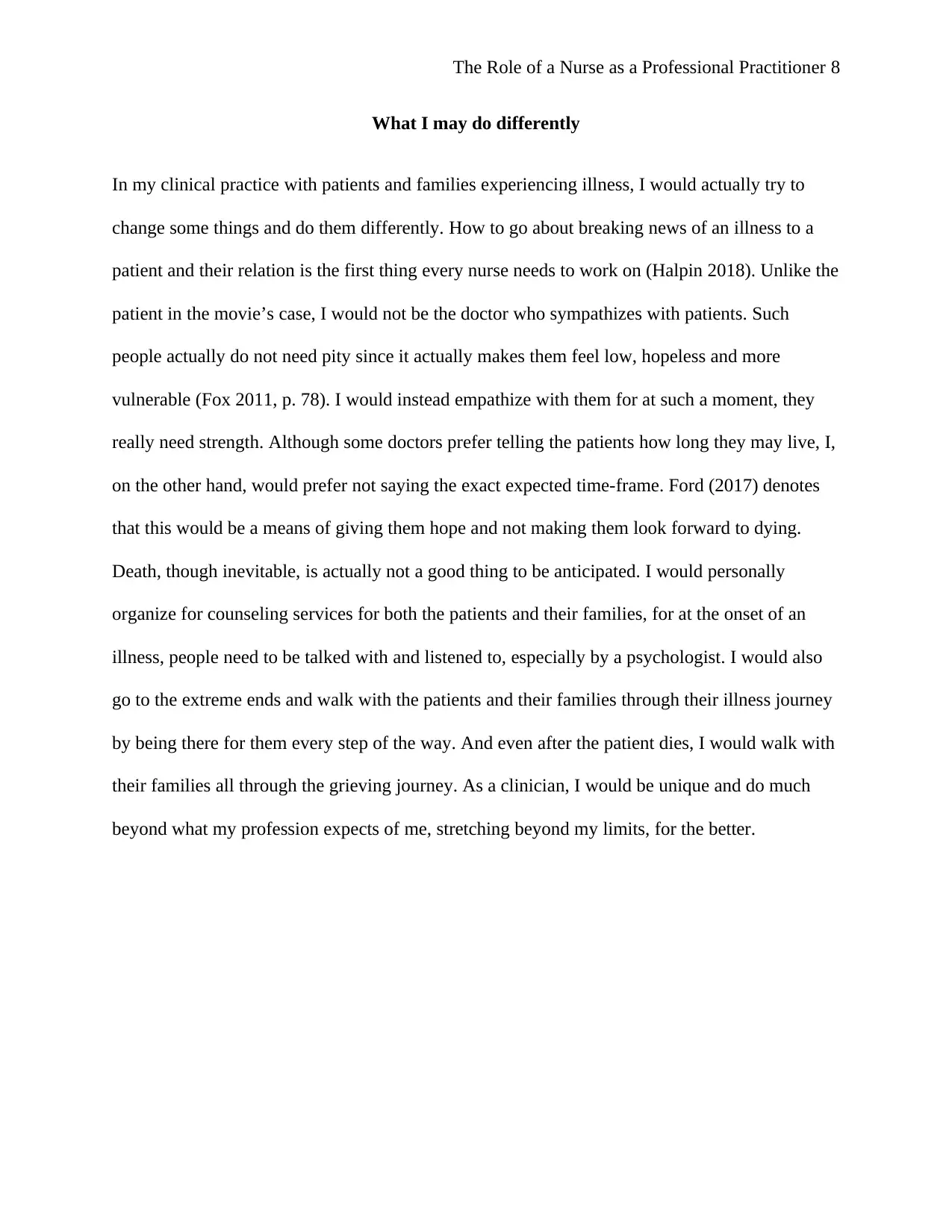
The Role of a Nurse as a Professional Practitioner 8
What I may do differently
In my clinical practice with patients and families experiencing illness, I would actually try to
change some things and do them differently. How to go about breaking news of an illness to a
patient and their relation is the first thing every nurse needs to work on (Halpin 2018). Unlike the
patient in the movie’s case, I would not be the doctor who sympathizes with patients. Such
people actually do not need pity since it actually makes them feel low, hopeless and more
vulnerable (Fox 2011, p. 78). I would instead empathize with them for at such a moment, they
really need strength. Although some doctors prefer telling the patients how long they may live, I,
on the other hand, would prefer not saying the exact expected time-frame. Ford (2017) denotes
that this would be a means of giving them hope and not making them look forward to dying.
Death, though inevitable, is actually not a good thing to be anticipated. I would personally
organize for counseling services for both the patients and their families, for at the onset of an
illness, people need to be talked with and listened to, especially by a psychologist. I would also
go to the extreme ends and walk with the patients and their families through their illness journey
by being there for them every step of the way. And even after the patient dies, I would walk with
their families all through the grieving journey. As a clinician, I would be unique and do much
beyond what my profession expects of me, stretching beyond my limits, for the better.
What I may do differently
In my clinical practice with patients and families experiencing illness, I would actually try to
change some things and do them differently. How to go about breaking news of an illness to a
patient and their relation is the first thing every nurse needs to work on (Halpin 2018). Unlike the
patient in the movie’s case, I would not be the doctor who sympathizes with patients. Such
people actually do not need pity since it actually makes them feel low, hopeless and more
vulnerable (Fox 2011, p. 78). I would instead empathize with them for at such a moment, they
really need strength. Although some doctors prefer telling the patients how long they may live, I,
on the other hand, would prefer not saying the exact expected time-frame. Ford (2017) denotes
that this would be a means of giving them hope and not making them look forward to dying.
Death, though inevitable, is actually not a good thing to be anticipated. I would personally
organize for counseling services for both the patients and their families, for at the onset of an
illness, people need to be talked with and listened to, especially by a psychologist. I would also
go to the extreme ends and walk with the patients and their families through their illness journey
by being there for them every step of the way. And even after the patient dies, I would walk with
their families all through the grieving journey. As a clinician, I would be unique and do much
beyond what my profession expects of me, stretching beyond my limits, for the better.

The Role of a Nurse as a Professional Practitioner 9
List of References
Halpin, M, 2018, ‘Science and Suffering: Genetics and the Lived Experience of
Illness’, Social Problems, 65(3), pp. 360–376. doi: 10.1093/socpro/spw057.
Fox, F. E, 2011, ‘Junior doctors’ experiences of personal illness: a qualitative
study’, Medical Education, 45(12), pp. 1251–1261. doi: 10.1111/j.1365-2923.2011.04083.x.
Irreplaceable You 2018. Distributed by Netflix. Directed by Stephanie Laing. (Terminal
Cancer)
Ford, R, 2017, "Christopher Walken, Steve Coogan Join 'Irreplaceable You'
(Exclusive)". The Hollywood Reporter. Prometheus Global Media. Retrieved March 12,
2019
Budowski, J, , 2018. "Netflix February 2018: Complete List Of Netflix Movies, Netflix
Shows, Netflix Originals, And More". Decider. Retrieved March 12, 2019
"Irreplaceable You (2018)". Rotten Tomatoes. Fandango. Retrieved March 12, 2019
"Irreplaceable You Reviews". Metacritic. CBS Interactive. Retrieved March 12, 2019
List of References
Halpin, M, 2018, ‘Science and Suffering: Genetics and the Lived Experience of
Illness’, Social Problems, 65(3), pp. 360–376. doi: 10.1093/socpro/spw057.
Fox, F. E, 2011, ‘Junior doctors’ experiences of personal illness: a qualitative
study’, Medical Education, 45(12), pp. 1251–1261. doi: 10.1111/j.1365-2923.2011.04083.x.
Irreplaceable You 2018. Distributed by Netflix. Directed by Stephanie Laing. (Terminal
Cancer)
Ford, R, 2017, "Christopher Walken, Steve Coogan Join 'Irreplaceable You'
(Exclusive)". The Hollywood Reporter. Prometheus Global Media. Retrieved March 12,
2019
Budowski, J, , 2018. "Netflix February 2018: Complete List Of Netflix Movies, Netflix
Shows, Netflix Originals, And More". Decider. Retrieved March 12, 2019
"Irreplaceable You (2018)". Rotten Tomatoes. Fandango. Retrieved March 12, 2019
"Irreplaceable You Reviews". Metacritic. CBS Interactive. Retrieved March 12, 2019
⊘ This is a preview!⊘
Do you want full access?
Subscribe today to unlock all pages.

Trusted by 1+ million students worldwide
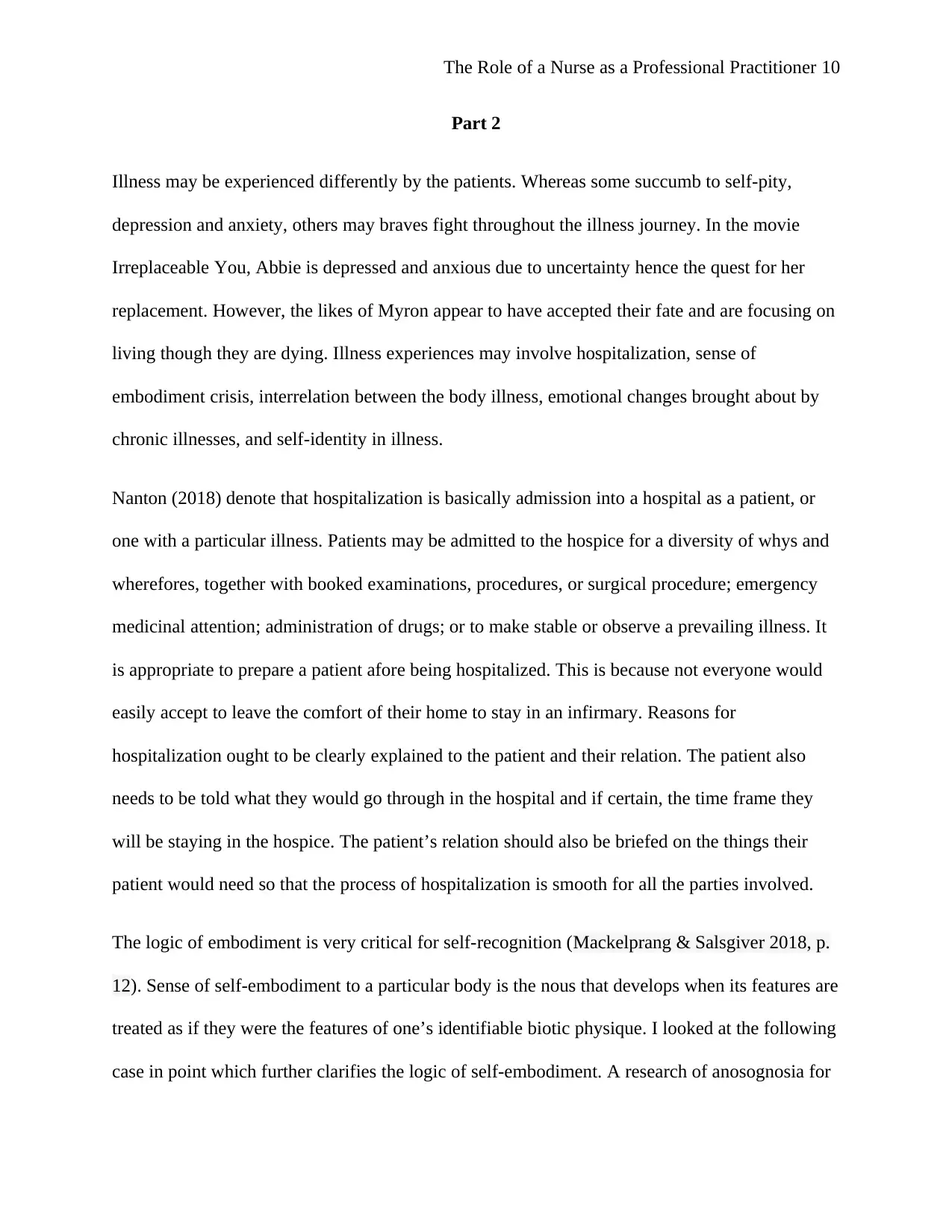
The Role of a Nurse as a Professional Practitioner 10
Part 2
Illness may be experienced differently by the patients. Whereas some succumb to self-pity,
depression and anxiety, others may braves fight throughout the illness journey. In the movie
Irreplaceable You, Abbie is depressed and anxious due to uncertainty hence the quest for her
replacement. However, the likes of Myron appear to have accepted their fate and are focusing on
living though they are dying. Illness experiences may involve hospitalization, sense of
embodiment crisis, interrelation between the body illness, emotional changes brought about by
chronic illnesses, and self-identity in illness.
Nanton (2018) denote that hospitalization is basically admission into a hospital as a patient, or
one with a particular illness. Patients may be admitted to the hospice for a diversity of whys and
wherefores, together with booked examinations, procedures, or surgical procedure; emergency
medicinal attention; administration of drugs; or to make stable or observe a prevailing illness. It
is appropriate to prepare a patient afore being hospitalized. This is because not everyone would
easily accept to leave the comfort of their home to stay in an infirmary. Reasons for
hospitalization ought to be clearly explained to the patient and their relation. The patient also
needs to be told what they would go through in the hospital and if certain, the time frame they
will be staying in the hospice. The patient’s relation should also be briefed on the things their
patient would need so that the process of hospitalization is smooth for all the parties involved.
The logic of embodiment is very critical for self-recognition (Mackelprang & Salsgiver 2018, p.
12). Sense of self-embodiment to a particular body is the nous that develops when its features are
treated as if they were the features of one’s identifiable biotic physique. I looked at the following
case in point which further clarifies the logic of self-embodiment. A research of anosognosia for
Part 2
Illness may be experienced differently by the patients. Whereas some succumb to self-pity,
depression and anxiety, others may braves fight throughout the illness journey. In the movie
Irreplaceable You, Abbie is depressed and anxious due to uncertainty hence the quest for her
replacement. However, the likes of Myron appear to have accepted their fate and are focusing on
living though they are dying. Illness experiences may involve hospitalization, sense of
embodiment crisis, interrelation between the body illness, emotional changes brought about by
chronic illnesses, and self-identity in illness.
Nanton (2018) denote that hospitalization is basically admission into a hospital as a patient, or
one with a particular illness. Patients may be admitted to the hospice for a diversity of whys and
wherefores, together with booked examinations, procedures, or surgical procedure; emergency
medicinal attention; administration of drugs; or to make stable or observe a prevailing illness. It
is appropriate to prepare a patient afore being hospitalized. This is because not everyone would
easily accept to leave the comfort of their home to stay in an infirmary. Reasons for
hospitalization ought to be clearly explained to the patient and their relation. The patient also
needs to be told what they would go through in the hospital and if certain, the time frame they
will be staying in the hospice. The patient’s relation should also be briefed on the things their
patient would need so that the process of hospitalization is smooth for all the parties involved.
The logic of embodiment is very critical for self-recognition (Mackelprang & Salsgiver 2018, p.
12). Sense of self-embodiment to a particular body is the nous that develops when its features are
treated as if they were the features of one’s identifiable biotic physique. I looked at the following
case in point which further clarifies the logic of self-embodiment. A research of anosognosia for
Paraphrase This Document
Need a fresh take? Get an instant paraphrase of this document with our AI Paraphraser
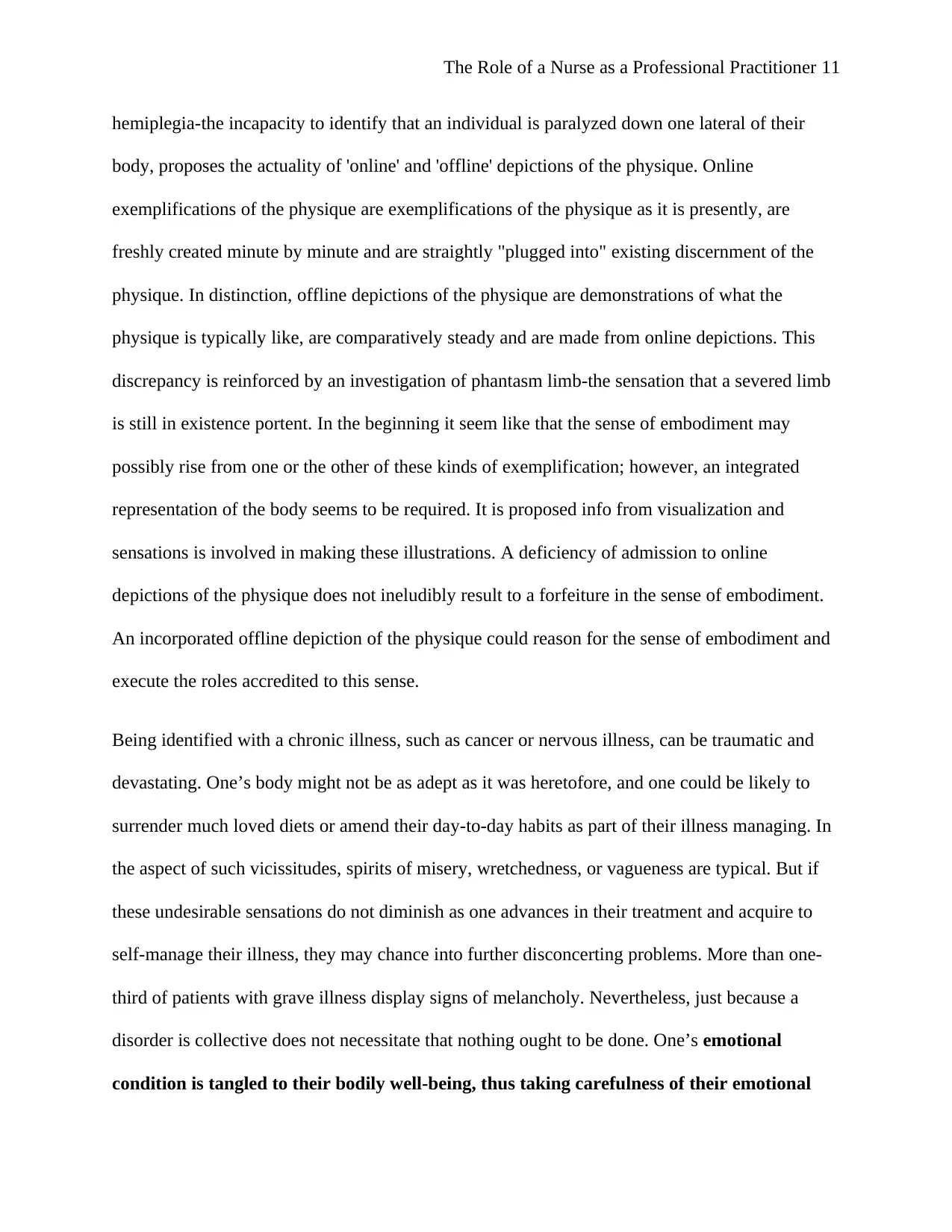
The Role of a Nurse as a Professional Practitioner 11
hemiplegia-the incapacity to identify that an individual is paralyzed down one lateral of their
body, proposes the actuality of 'online' and 'offline' depictions of the physique. Online
exemplifications of the physique are exemplifications of the physique as it is presently, are
freshly created minute by minute and are straightly "plugged into" existing discernment of the
physique. In distinction, offline depictions of the physique are demonstrations of what the
physique is typically like, are comparatively steady and are made from online depictions. This
discrepancy is reinforced by an investigation of phantasm limb-the sensation that a severed limb
is still in existence portent. In the beginning it seem like that the sense of embodiment may
possibly rise from one or the other of these kinds of exemplification; however, an integrated
representation of the body seems to be required. It is proposed info from visualization and
sensations is involved in making these illustrations. A deficiency of admission to online
depictions of the physique does not ineludibly result to a forfeiture in the sense of embodiment.
An incorporated offline depiction of the physique could reason for the sense of embodiment and
execute the roles accredited to this sense.
Being identified with a chronic illness, such as cancer or nervous illness, can be traumatic and
devastating. One’s body might not be as adept as it was heretofore, and one could be likely to
surrender much loved diets or amend their day-to-day habits as part of their illness managing. In
the aspect of such vicissitudes, spirits of misery, wretchedness, or vagueness are typical. But if
these undesirable sensations do not diminish as one advances in their treatment and acquire to
self-manage their illness, they may chance into further disconcerting problems. More than one-
third of patients with grave illness display signs of melancholy. Nevertheless, just because a
disorder is collective does not necessitate that nothing ought to be done. One’s emotional
condition is tangled to their bodily well-being, thus taking carefulness of their emotional
hemiplegia-the incapacity to identify that an individual is paralyzed down one lateral of their
body, proposes the actuality of 'online' and 'offline' depictions of the physique. Online
exemplifications of the physique are exemplifications of the physique as it is presently, are
freshly created minute by minute and are straightly "plugged into" existing discernment of the
physique. In distinction, offline depictions of the physique are demonstrations of what the
physique is typically like, are comparatively steady and are made from online depictions. This
discrepancy is reinforced by an investigation of phantasm limb-the sensation that a severed limb
is still in existence portent. In the beginning it seem like that the sense of embodiment may
possibly rise from one or the other of these kinds of exemplification; however, an integrated
representation of the body seems to be required. It is proposed info from visualization and
sensations is involved in making these illustrations. A deficiency of admission to online
depictions of the physique does not ineludibly result to a forfeiture in the sense of embodiment.
An incorporated offline depiction of the physique could reason for the sense of embodiment and
execute the roles accredited to this sense.
Being identified with a chronic illness, such as cancer or nervous illness, can be traumatic and
devastating. One’s body might not be as adept as it was heretofore, and one could be likely to
surrender much loved diets or amend their day-to-day habits as part of their illness managing. In
the aspect of such vicissitudes, spirits of misery, wretchedness, or vagueness are typical. But if
these undesirable sensations do not diminish as one advances in their treatment and acquire to
self-manage their illness, they may chance into further disconcerting problems. More than one-
third of patients with grave illness display signs of melancholy. Nevertheless, just because a
disorder is collective does not necessitate that nothing ought to be done. One’s emotional
condition is tangled to their bodily well-being, thus taking carefulness of their emotional
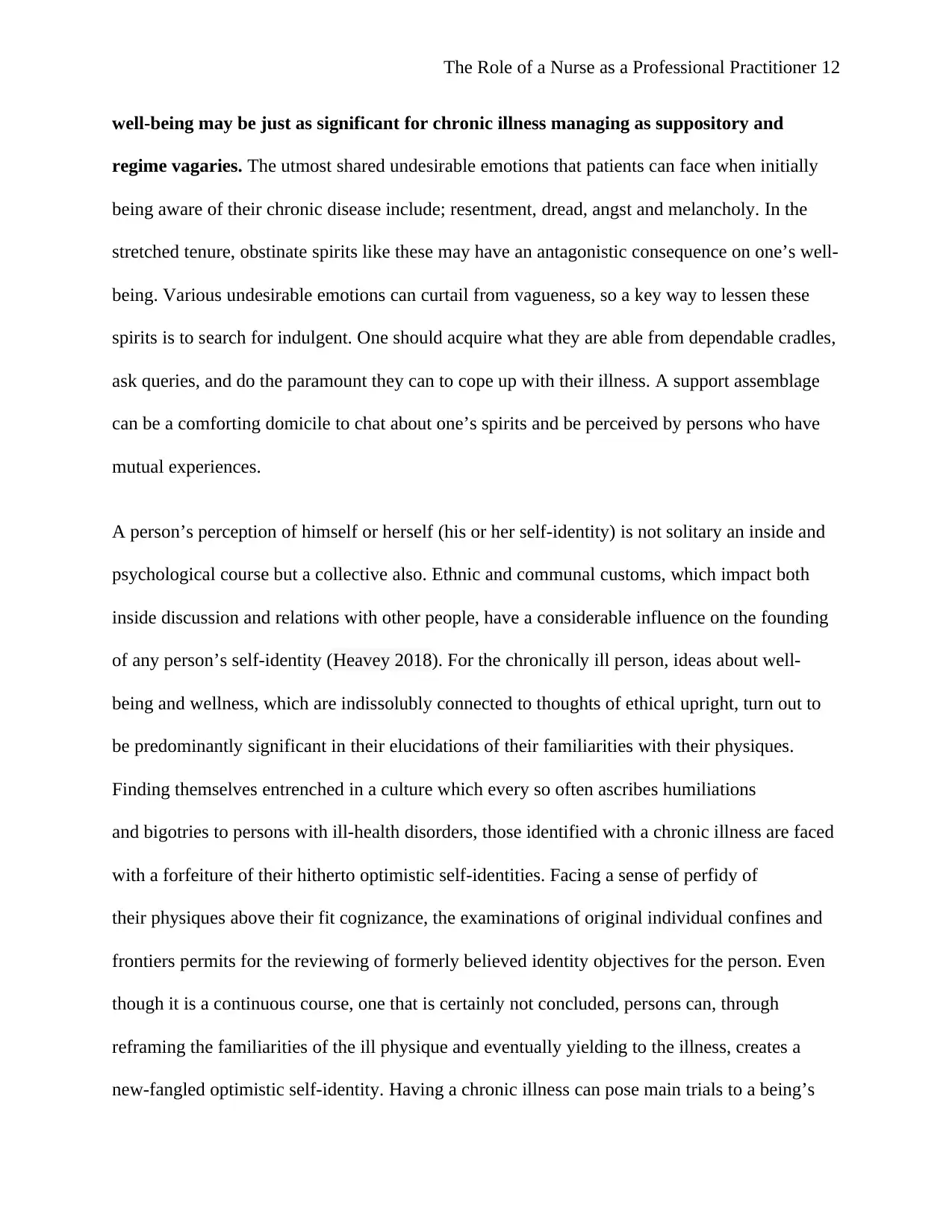
The Role of a Nurse as a Professional Practitioner 12
well-being may be just as significant for chronic illness managing as suppository and
regime vagaries. The utmost shared undesirable emotions that patients can face when initially
being aware of their chronic disease include; resentment, dread, angst and melancholy. In the
stretched tenure, obstinate spirits like these may have an antagonistic consequence on one’s well-
being. Various undesirable emotions can curtail from vagueness, so a key way to lessen these
spirits is to search for indulgent. One should acquire what they are able from dependable cradles,
ask queries, and do the paramount they can to cope up with their illness. A support assemblage
can be a comforting domicile to chat about one’s spirits and be perceived by persons who have
mutual experiences.
A person’s perception of himself or herself (his or her self-identity) is not solitary an inside and
psychological course but a collective also. Ethnic and communal customs, which impact both
inside discussion and relations with other people, have a considerable influence on the founding
of any person’s self-identity (Heavey 2018). For the chronically ill person, ideas about well-
being and wellness, which are indissolubly connected to thoughts of ethical upright, turn out to
be predominantly significant in their elucidations of their familiarities with their physiques.
Finding themselves entrenched in a culture which every so often ascribes humiliations
and bigotries to persons with ill-health disorders, those identified with a chronic illness are faced
with a forfeiture of their hitherto optimistic self-identities. Facing a sense of perfidy of
their physiques above their fit cognizance, the examinations of original individual confines and
frontiers permits for the reviewing of formerly believed identity objectives for the person. Even
though it is a continuous course, one that is certainly not concluded, persons can, through
reframing the familiarities of the ill physique and eventually yielding to the illness, creates a
new-fangled optimistic self-identity. Having a chronic illness can pose main trials to a being’s
well-being may be just as significant for chronic illness managing as suppository and
regime vagaries. The utmost shared undesirable emotions that patients can face when initially
being aware of their chronic disease include; resentment, dread, angst and melancholy. In the
stretched tenure, obstinate spirits like these may have an antagonistic consequence on one’s well-
being. Various undesirable emotions can curtail from vagueness, so a key way to lessen these
spirits is to search for indulgent. One should acquire what they are able from dependable cradles,
ask queries, and do the paramount they can to cope up with their illness. A support assemblage
can be a comforting domicile to chat about one’s spirits and be perceived by persons who have
mutual experiences.
A person’s perception of himself or herself (his or her self-identity) is not solitary an inside and
psychological course but a collective also. Ethnic and communal customs, which impact both
inside discussion and relations with other people, have a considerable influence on the founding
of any person’s self-identity (Heavey 2018). For the chronically ill person, ideas about well-
being and wellness, which are indissolubly connected to thoughts of ethical upright, turn out to
be predominantly significant in their elucidations of their familiarities with their physiques.
Finding themselves entrenched in a culture which every so often ascribes humiliations
and bigotries to persons with ill-health disorders, those identified with a chronic illness are faced
with a forfeiture of their hitherto optimistic self-identities. Facing a sense of perfidy of
their physiques above their fit cognizance, the examinations of original individual confines and
frontiers permits for the reviewing of formerly believed identity objectives for the person. Even
though it is a continuous course, one that is certainly not concluded, persons can, through
reframing the familiarities of the ill physique and eventually yielding to the illness, creates a
new-fangled optimistic self-identity. Having a chronic illness can pose main trials to a being’s
⊘ This is a preview!⊘
Do you want full access?
Subscribe today to unlock all pages.

Trusted by 1+ million students worldwide
1 out of 23
Your All-in-One AI-Powered Toolkit for Academic Success.
+13062052269
info@desklib.com
Available 24*7 on WhatsApp / Email
![[object Object]](/_next/static/media/star-bottom.7253800d.svg)
Unlock your academic potential
Copyright © 2020–2026 A2Z Services. All Rights Reserved. Developed and managed by ZUCOL.


